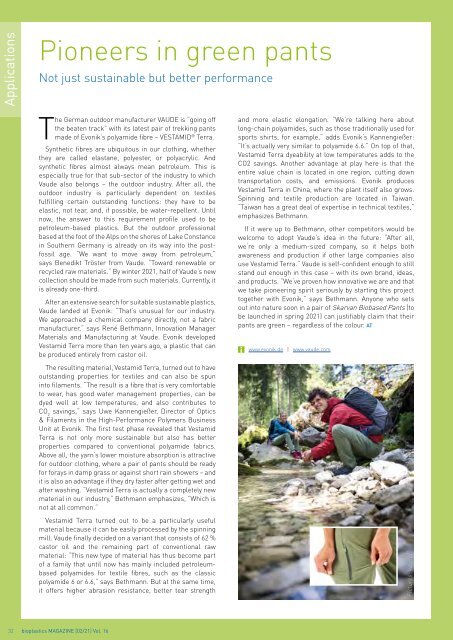issue 02/2021
Highlights: Injection Moulding Basics: Mass Balance
Highlights:
Injection Moulding
Basics: Mass Balance
You also want an ePaper? Increase the reach of your titles
YUMPU automatically turns print PDFs into web optimized ePapers that Google loves.
Applications<br />
Pioneers in green pants<br />
Not just sustainable but better performance<br />
The German outdoor manufacturer VAUDE is “going off<br />
the beaten track” with its latest pair of trekking pants<br />
made of Evonik’s polyamide fibre – VESTAMID ® Terra.<br />
Synthetic fibres are ubiquitous in our clothing, whether<br />
they are called elastane, polyester, or polyacrylic. And<br />
synthetic fibres almost always mean petroleum. This is<br />
especially true for that sub-sector of the industry to which<br />
Vaude also belongs – the outdoor industry. After all, the<br />
outdoor industry is particularly dependent on textiles<br />
fulfilling certain outstanding functions: they have to be<br />
elastic, not tear, and, if possible, be water-repellent. Until<br />
now, the answer to this requirement profile used to be<br />
petroleum-based plastics. But the outdoor professional<br />
based at the foot of the Alps on the shores of Lake Constance<br />
in Southern Germany is already on its way into the postfossil<br />
age. “We want to move away from petroleum,“<br />
says Benedikt Tröster from Vaude. “Toward renewable or<br />
recycled raw materials.“ By winter 2<strong>02</strong>1, half of Vaude‘s new<br />
collection should be made from such materials. Currently, it<br />
is already one-third.<br />
After an extensive search for suitable sustainable plastics,<br />
Vaude landed at Evonik: “That‘s unusual for our industry.<br />
We approached a chemical company directly, not a fabric<br />
manufacturer,“ says René Bethmann, Innovation Manager<br />
Materials and Manufacturing at Vaude. Evonik developed<br />
Vestamid Terra more than ten years ago, a plastic that can<br />
be produced entirely from castor oil.<br />
The resulting material, Vestamid Terra, turned out to have<br />
outstanding properties for textiles and can also be spun<br />
into filaments. “The result is a fibre that is very comfortable<br />
to wear, has good water management properties, can be<br />
dyed well at low temperatures, and also contributes to<br />
CO 2<br />
savings,“ says Uwe Kannengießer, Director of Optics<br />
& Filaments in the High-Performance Polymers Business<br />
Unit at Evonik. The first test phase revealed that Vestamid<br />
Terra is not only more sustainable but also has better<br />
properties compared to conventional polyamide fabrics.<br />
Above all, the yarn‘s lower moisture absorption is attractive<br />
for outdoor clothing, where a pair of pants should be ready<br />
for forays in damp grass or against short rain showers – and<br />
it is also an advantage if they dry faster after getting wet and<br />
after washing. “Vestamid Terra is actually a completely new<br />
material in our industry,“ Bethmann emphasizes, “Which is<br />
not at all common.“<br />
Vestamid Terra turned out to be a particularly useful<br />
material because it can be easily processed by the spinning<br />
mill. Vaude finally decided on a variant that consists of 62 %<br />
castor oil and the remaining part of conventional raw<br />
material: “This new type of material has thus become part<br />
of a family that until now has mainly included petroleumbased<br />
polyamides for textile fibres, such as the classic<br />
polyamide 6 or 6.6,“ says Bethmann. But at the same time,<br />
it offers higher abrasion resistance, better tear strength<br />
and more elastic elongation. “We‘re talking here about<br />
long-chain polyamides, such as those traditionally used for<br />
sports shirts, for example,“ adds Evonik‘s Kannengießer:<br />
“It‘s actually very similar to polyamide 6.6.“ On top of that,<br />
Vestamid Terra dyeability at low temperatures adds to the<br />
CO2 savings. Another advantage at play here is that the<br />
entire value chain is located in one region, cutting down<br />
transportation costs, and emissions. Evonik produces<br />
Vestamid Terra in China, where the plant itself also grows.<br />
Spinning and textile production are located in Taiwan.<br />
“Taiwan has a great deal of expertise in technical textiles,“<br />
emphasizes Bethmann.<br />
If it were up to Bethmann, other competitors would be<br />
welcome to adopt Vaude‘s idea in the future: “After all,<br />
we‘re only a medium-sized company, so it helps both<br />
awareness and production if other large companies also<br />
use Vestamid Terra.“ Vaude is self-confident enough to still<br />
stand out enough in this case – with its own brand, ideas,<br />
and products. “We‘ve proven how innovative we are and that<br />
we take pioneering spirit seriously by starting this project<br />
together with Evonik,“ says Bethmann. Anyone who sets<br />
out into nature soon in a pair of Skarvan Biobased Pants (to<br />
be launched in spring 2<strong>02</strong>1) can justifiably claim that their<br />
pants are green – regardless of the colour. AT<br />
www.evonik.de | www.vaude.com<br />
Pictures: Vaude)<br />
32 bioplastics MAGAZINE [<strong>02</strong>/21] Vol. 16


















